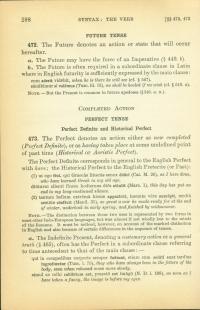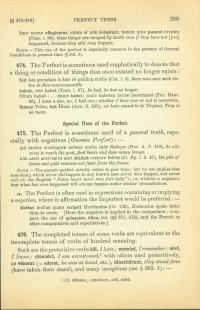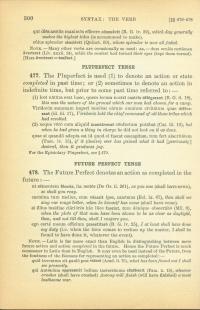473. The perfect denotes an action either as now completed (Perfect Definite), or as having taken place at some undefined point of past time (Historical or Aoristic Perfect). The Perfect Definite corresponds in general to the English perfect with have; the Historical Perfect to the English preterite (or past).
ut ego fēcī, quī Graecās litterās senex didicī (Cat. M. 26)
as I have done, who have learned Greek in my old age
Diūturnī silentī fīnem hodiernus diēs attulit. (Marc. 1)
This day has put an end to my long-continued silence.
Tantum bellum extrēmā hieme apparāvit, ineunte vēre suscēpit, mediā aestāte cōnfēcit. (Manil. 35)
So great a war he made ready for at the end of winter, undertook in early spring, and finished by midsummer.
Note— The distinction between these two uses is represented by two forms in most other Indo-European languages, but was almost if not wholly lost to the minds of the Romans. It must be noticed, however, on account of the marked distinction in English and also because of certain differences in the sequence of tenses.
a. The indefinite present, denoting a customary action or a general truth (§ 465), often has the perfect in a subordinate clause referring to time antecedent to that of the main clause.
Quī in compedibus corporis semper fuērunt, etiam cum solūtī sunt tardius ingrediuntur. (Tusc. 1.75)
Those who have always been in the fetters of the body, even when released move more slowly.
Simul ac mihi collibitum est, praestō estimāgō. (N. D. 1.108)
As soon as I have taken a fancy, the image is before my eyes.
Haec morte effugiuntur, etiam sī nōn ēvēnērunt, tamen quia possuntēvenīre (Tusc. 1.86)
These things are escaped by death even if they have not [yet] happened, because they still may happen.
Note— This use of the perfect is especially common in the protasis of general conditions in present time (§ 518.b).
474. The perfect is sometimes used emphatically to denote that a thing or condition of things that once existed no longer does.
Fuit ista quondam in hāc rē pūblicā virtūs. (Cat. 1.3)
There was once such virtue in this commonwealth.
Habuit, nōn habet. (Tusc. 1.87)
He had, he has no longer.
Fīlium habeō . . . immo habuī; nunc habeam necne incertumst. (Ter. Haut. 93)
I have a son, no, I had one; whether I have now or not is uncertain.
Fuimus Trōes, fuit Īlium. (Aen. 2.325)
We have ceased to be Trojans, Troy is no more.
475. The perfect is sometimes used of a general truth, especially with negatives (Gnomic Perfect).
Quī studet contingere mētam multa tulit fēcitque. (Hor. A. P. 412)
He who aims to reach the goal, first bears and does many things.
Nōn aeris acervus et aurī dēdūxit corpore febrīs. (id. Ep. 1.2.47)
The pile of brass and gold does not removes fever from the frame.
Note— The Gnomic Perfect strictly refers to past time; but its use implies that something which never did happen in any known case never does happen, and never will (cf. the English “Faint heart never won fair lady”); or, without a negative that what has once happened will always happen under similar circumstances.
a. The perfect is often used in expressions containing or implying a negation, where in affirmation the imperfect would be preferred.
dīcēbat melius quam scrīpsit Hortēnsius (Or. 132)
Hortensius spoke better than he wrote.
[Here the negative is implied in the comparison: compare the use of quisquam, ūllus, etc. (§§ 311-312), and the French ne after comparatives and superlatives.]
476. The completed tenses of some verbs are equivalent to the incomplete tenses of verbs of kindred meaning. Such are the preteritive verbs ōdī (I hate), meminī (I remember), nōvī (I know), cōnsuēvī (I am accustomed)1 with others used preteritively, as vēnerat ( = aderat He was at hand, etc.), cōnstitērunt (they stand firm; have taken their stand), and many inceptives (see § 263.1).
quī diēs aestūs maximōs efficere cōnsuēvit (B. G. 4.29)
which day generally makes the highest tides (is accustomed to make)
cûius splendor obsolēvit (Quinct. 59)
whose splendor is now all faded.
Note— Many other verbs are occasionally so used.
dum oculōs certāmen āverterat (Liv. 32.24)
while the contest had turned their eyes (kept them turned)
[Here āverterat = tenēbat]



